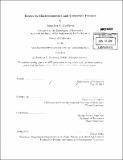| dc.contributor.advisor | Ricardo J. Caballero and George-Marios Angeletos. | en_US |
| dc.contributor.author | Goldberg, Jonathan E. (Jonathan Elliot) | en_US |
| dc.contributor.other | Massachusetts Institute of Technology. Dept. of Economics. | en_US |
| dc.date.accessioned | 2011-08-30T15:41:16Z | |
| dc.date.available | 2011-08-30T15:41:16Z | |
| dc.date.copyright | 2011 | en_US |
| dc.date.issued | 2011 | en_US |
| dc.identifier.uri | http://hdl.handle.net/1721.1/65487 | |
| dc.description | Thesis (Ph. D.)--Massachusetts Institute of Technology, Dept. of Economics, 2011. | en_US |
| dc.description | Cataloged from PDF version of thesis. | en_US |
| dc.description | Includes bibliographical references. | en_US |
| dc.description.abstract | This thesis examines questions at the intersection of macroeconomics and finance. Chapter 1 studies the persistent effects of a decrease in firms' ability to borrow. I develop a tractable model of deleveraging that emphasizes (i) firms as suppliers of financial assets to consumers and (ii) the ability of firms and consumers to alleviate financial frictions by accumulating wealth. In the model, a permanent decrease in the ability of firms to borrow leads to: increased capital misallocation and decreased total factor productivity (TFP); an increased wedge between the average marginal product of capital and the interest rate; and increased riskiness of consumption. An endogenous decrease in the interest rate is shown to amplify these effects by discouraging wealth accumulation. In a calibration using U.S. firm-level data, I find these amplification effects are large. Chapter 2 studies how proprietary trading and advising are combined on Wall Street even though a firm that engages in both of these activities may be tempted to mislead its clients. Chapter 3 studies the effects of government purchases of long-term debt. According to one interpretation, the preferred-habitat model of Vayanos and Vila (2009) implies that Federal Reserve purchases of long-term bonds generate a reduction in long-term interest rates. In this paper, I clarify this interpretation. In particular, in a Vayanos and Vila (2009) preferred-habitat model, I show that maturity-lengthening open-market operations have no effect on long-term interest rates if agents in the economy ultimately receive the profits from the government's portfolio via lump-sum taxes or transfers. I then introduce limited participation - an assumption that some agents are restricted from trading bonds of certain or all maturities. I show that limited participation implies that open-market operations do reduce the long-term interest rate. What drives this result is limited participation, not preferred-habitat preferences. With this motivation, I develop a model, with a more reasonable form of limited participation and without preferred-habitat preferences, in which open-market operations are relevant. Finally, I use these models to discuss how arbitrageurs' wealth covaries with technology or endowment shocks, and how this covariance is affected by open-market operations. | en_US |
| dc.description.statementofresponsibility | by Jonathan E. Goldberg. | en_US |
| dc.format.extent | 164 p. | en_US |
| dc.language.iso | eng | en_US |
| dc.publisher | Massachusetts Institute of Technology | en_US |
| dc.rights | M.I.T. theses are protected by
copyright. They may be viewed from this source for any purpose, but
reproduction or distribution in any format is prohibited without written
permission. See provided URL for inquiries about permission. | en_US |
| dc.rights.uri | http://dspace.mit.edu/handle/1721.1/7582 | en_US |
| dc.subject | Economics. | en_US |
| dc.title | Essays in macroeconomics and corporate finance | en_US |
| dc.type | Thesis | en_US |
| dc.description.degree | Ph.D. | en_US |
| dc.contributor.department | Massachusetts Institute of Technology. Department of Economics | |
| dc.identifier.oclc | 746649068 | en_US |
